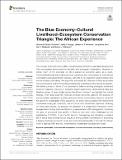The blue economy - cultural livelihood - ecosystem conservation triangle : the African experience
Abstract
The concept of Blue Economy (BE) is recognised as central for sustainable development that incorporates socio-economic benefits and ecological conservation. However, in Africa, much of the emphasis on BE is placed on economic gains; as a result, traditional livelihoods and small-scale local operations are outcompeted by international corporations and government initiatives, with little or no regard for social inclusion and environmental sustainability. We argue that successful BE initiatives in Africa accentuate the involvement of local communities and promote sustenance of the natural ecosystem. We define success in terms of the sustainability balance among ecological, social and economic aspects. Drawing on extensive expert experiences, observational data and literature review of case studies across the African continent, we highlight two critical findings. First, large scale BE initiatives prioritise economic gains at the expense of environmental degradation and the exclusion of local communities. Second, using the full spectrum sustainability (FSS) evaluation, we show that successful BE interventions considered ecological, economic, socio-cultural and institutional objectives. Drawing on these case studies, we propose the adoption of a collaborative framework which amalgamates the top-down and bottom-up approaches to BE management. Achieving the goal of successful blue growth in Africa is now even more challenged by the implications of COVID-19 on the BE sectors. Reimagining and rebuilding a resilient BE in Africa post-coronavirus will require a strong political commitment to promoting a balance between economic, social and environmental benefits in line with the African Union's Agenda 2063 and the United Nations' Sustainable Development Goals.
Citation
Okafor-Yarwood , I , Kadagi , N I , Miranda , N , Uku , J , Elegbede , I O & Adewumi , I J 2020 , ' The blue economy - cultural livelihood - ecosystem conservation triangle : the African experience ' , Frontiers in Marine Science , vol. 7 , 586 . https://doi.org/10.3389/fmars.2020.00586
Publication
Frontiers in Marine Science
Status
Peer reviewed
ISSN
2296-7745Type
Journal article
Description
Publications costs were supported by the University of St Andrews to IO-Y and the New England Aquarium-Marine Conservation and Action Fund (MCAF) to NK.Collections
Items in the St Andrews Research Repository are protected by copyright, with all rights reserved, unless otherwise indicated.

